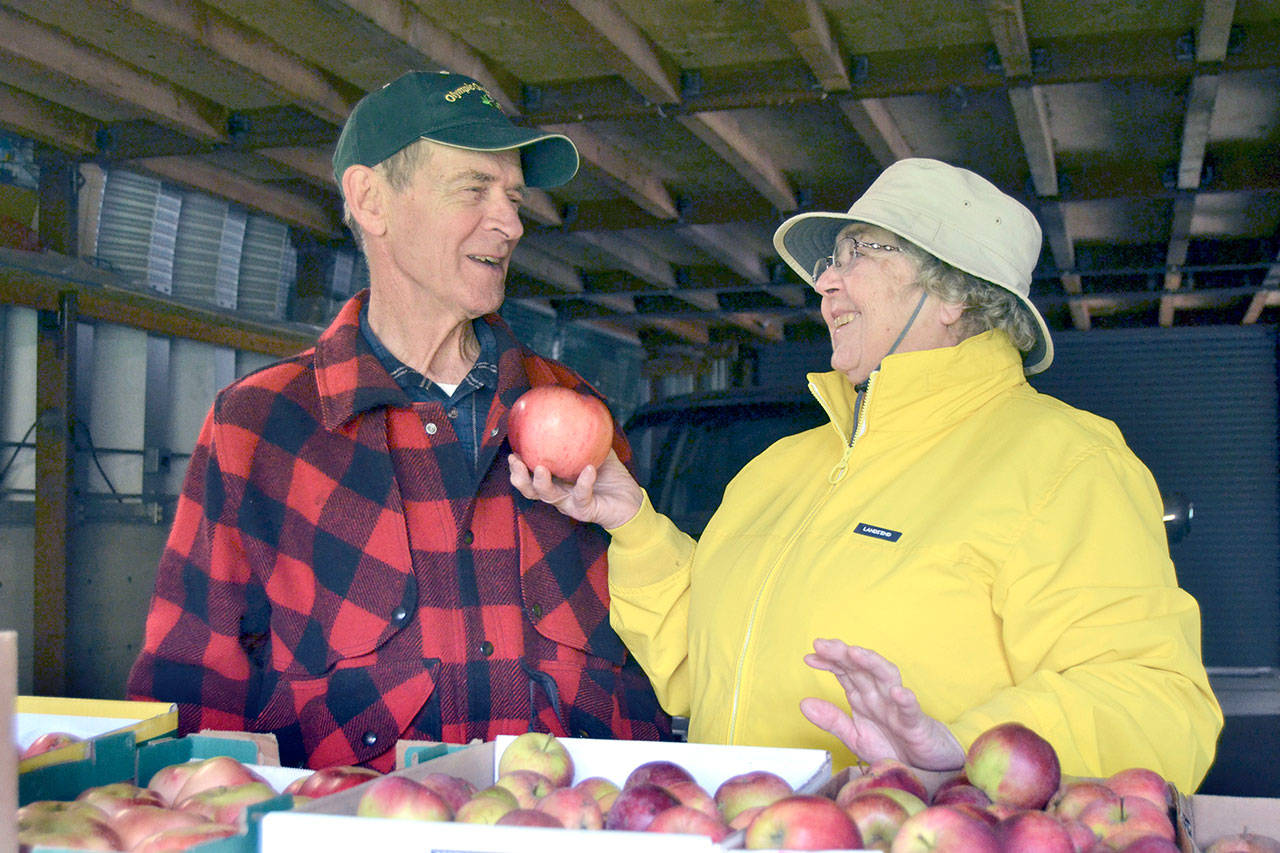SEQUIM — Big or small. In snow or sun. Young or retired. Alan and Leilani Kingsbury are proof an orchard can work for anyone, anywhere.
The couple has grown, harvested and stored fruit in both Sequim and Alaska. And after nearly 56 years of marriage, the Kingsburys find new ways to make fruit work for them, whether on a commercial farm or one residential acre.
“A lot of it is trial and error,” Alan said. “That’s where the fun is — making mistakes and learning from them.”
The couple, along with dozens of other local fruit growers, will gather for the Olympic Orchard Society’s Fall Fruit Show set for 10 a.m. to 3 p.m. Saturday in Trinity United Methodist Church, 100 S. Blake Ave., Sequim.
Admission will be free to members of the Olympic Orchard Society (family membership for 2020 is $20). Non-members will pay $3 per person or $5 per family.
The Kingsburys and other local growers will bring some of their unique fruits to the show, with about 200 varieties of apples and pears for display.
Show chair Marilyn Couture said the group will have about 25 types of apples for tasting that are at their perfect ripeness.
The Fall Fruit Show comes around every other year, she said, and features fruit trees for sale, educational speakers and an opportunity for people to identify their fruit.
Alan said these are varieties you wouldn’t find in the grocery store.
“They are adapted to growing in the conditions in our area,” he said.
Couture said experts from Oregon and Washington plan to help identify apples. Visitors are encouraged to bring four samples that are unwashed.
Speakers scheduled throughout the event will discuss cider tips, pruning, various growth methods and pests.
The show is for anyone, Couture said, especially those “with a backyard tree that they want to expand or know what they’ve got.”
An apple a day
It’s been a handful of years since the Kingsburys purchased an apple from a grocery store, they said.
Their home is proof that an orchard can be put to good use with canned fruit, dehydrated fruit and stocked cider on shelves and in storage.
Much of their crop goes to the Sequim Food Bank and gleaners to help programs like the Boys & Girls Clubs of the Olympic Peninsula.
Alan said he tends to follow the adage “an apple a day,” and has stayed relatively healthy.
He and Leilani met while attending the University of Wisconsin-Madison before settling in Alaska for 50 years after two-years of active duty with the U.S. Army.
Leilani became an elementary school teacher and Alan an employee of the state of Alaska in fisheries.
Fall into farming
About 15 years into his career, Alan said, the couple won a land lottery from the state. That led them to start their own farm, the Birch Creek Ranch in Talkeetna.
It specialized in hay, greenhouse plants and bedding and U-pick berries.
Alan said they had limited experience in farming but got help through family contacts in Wisconsin.
“We weren’t totally blind, but there were a lot of aspects we weren’t exposed to before, like taxes and how to make land produce,” he said.
But they weren’t alone.
“There were a lot of people with new land and limited experience,” Alan said.
The Kingsburys made the farm work for more than 35 years despite cold temperatures and months with extended snowfall. It continues to operate today.
“You’ve got to pick varieties that don’t have long growing cycles; medium to small apples,” Alan said.
“The long day length tends to make up for the late season.”
Said Leilani, “You can watch (apples) grow in a few hours.”
Alan added, “It’s a matter of learning to do it in a different climate.”
South to Sequim
Looking to retire, the Kingsburys purchased their home in Sequim in 2007.
Leilani said it had to have a big garden and an orchard.
“It still is a lot of work, but is about how much we can handle,” Alan said.
Their 1-acre parcel near West Washington Street boasts 17 fruit trees with 10 varieties of apples, pears, peaches and cherries.
Their apples, with varieties such as Elstar, Liberty and Melrose, aren’t regularly found in the grocery aisle. Each has its own use for the Kingsburys.
Elstar apples are extra sweet but don’t store well, Alan said.
Their Jonagold apples grow small so they are put to use as cider.
Leilani said they try to make at least 14 jars of cider to last until the next pressings.
They’ve also had big success with their Frost peach trees in recent years, picking more than 3,000 peaches from two trees.
Alan said they bruise easily, so they pick carefully, but Leilani cans, freezes, dehydrates and makes them into jam.
The two grow their fruit without pesticides and continue to try preventative methods for pests such as putting nylons over fruit. They’ve also started a mason bee colony to help pollinate their orchard.
They attribute their fruitful success in Sequim to the Olympic Orchard Society, the Master Gardeners program through Washington State University’s extension office and their years in Alaska.
About the society
Olympic Orchard Society, a Western Cascade Fruit Society Chapter, promotes interest in growing fruit- or nut-bearing trees Clallam County.
This nonprofit organization brings together orchardists and backyard growers who support each other and encourage propagation of desirable fruit and nut varieties suited to the local climate.
Couture said locals can connect with members to seek advice and possibly receive a home visit for more help.
“We want to help grow better fruit in the area,” she said.
For more information, call Marilyn Couture at 360-681-3036
________
Matthew Nash is a reporter with the Olympic Peninsula News Group, which is composed of Sound Publishing newspapers Peninsula Daily News, Sequim Gazette and Forks Forum. Reach him at mnash@sequimgazette.com.

